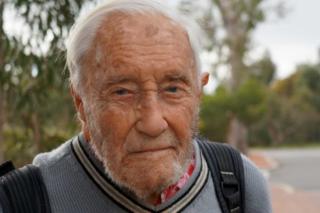
Image copyright
ABC
David Goodall said he wanted to end his life with dignity
He perceived no other option, so 104-year-old scientist David Goodall left his home in Australia and flew across the world to end his life.
The lauded ecologist and botanist did not suffer from a serious illness. But he wished to bring forward his death due to his diminishing independence.
“My abilities have been in decline over the past year or two, my eyesight over the past six years,” Dr Goodall told reporters in Switzerland, where he had organised his death.
“I no longer want to continue life. I’m happy to have the chance tomorrow to end it.”
Dr Goodall travelled to a clinic in the city of Basel to voluntarily end his life. He said he resented having to leave Australia to do so.
Active life
The London-born academic had lived on his own in a small flat in Perth, Western Australia, until only a few weeks ago.
He stepped back from full-time employment in 1979, but remained heavily involved in his field of work.
In his last years, Dr Goodall edited a 30-volume book series called Ecosystems of the World and was made a Member of the Order of Australia for his scientific work.
In 2016, aged 102, he won a battle to keep working on campus at Perth’s Edith Cowan University, where he was an unpaid honorary research associate.
He made his final trip out of Australia last week with his friend, Carol O’Neill, a representative from assisted dying advocacy group Exit International.
Image copyright
EXIT INTERNATIONAL
Carol O’Neill accompanied Dr Goodall on his trip to Europe
Mrs O’Neill said the dispute in 2016 over Dr Goodall’s working space had affected him greatly. The row began when the university raised concerns about his safety, including his ability to commute.
Although Dr Goodall ultimately prevailed, he was forced to work in a location closer to home. It came at a time when he was also forced to give up driving and performing in theatre, Mrs O’Neill said.
“It was just the beginning of the end,” she told the BBC.
“He didn’t get to see the same colleagues and friends any more at the old office. He just didn’t have the same spirit and he was packing up all his books. It was the beginning of not being happy any more.”
Dr Goodall’s decision to end his life was hastened by a serious fall in his apartment last month. He was not found for two days. Later, doctors said he needed to engage 24-hour care or be moved into a nursing home.
“He’s an independent man. He doesn’t want people around him all the time, a stranger acting as a carer. He doesn’t want that,” Mrs O’Neill said, prior to the scientist’s death.
“He wants to have intelligent conversation and still be able to do the same things like catching the bus into town.”
Divisive debate
Switzerland has allowed assisted suicide since 1942. Other countries and jurisdictions have passed laws allowing people to voluntarily end their life, but many state terminal illness as a condition of eligibility.
The Australian Medical Association (AMA) remains strongly opposed to assisted dying, which it sees as an unethical practice of medicine.
“Doctors are not trained to kill people. It is deep within our ethics, deep within our training that that’s not appropriate,” president Dr Michael Gannon said during last year’s legislative debate in the state of Victoria.
“Now, not every doctor agrees with that,” he added. Indeed, a survey of the AMA – Australia’s most influential medical association – found four in 10 members supported right-to-die policies.
In his last days in Australia, the scientist revised his final letters and bade farewell to his extended family, including his many grandchildren.
Image copyright
EXIT INTERNATIONAL
Dr Goodall, pictured here in Australia, was joined in Switzerland by close relatives
An online petition raised $A20,000 (£11,000; $15,000) for the scientist to fly in business class to Europe. He rested with family in France before heading to Switzerland with his closest relatives.
His story gained attention locally at a time when his home state, Western Australia, is considering whether to debate assisted dying legislation.
The state government had publicly expressed sympathy for Dr Goodall, but said any proposed legislation would cover only terminally ill patients.
Dr Goodall said he would have preferred the chance to end his life in Australia. In his final appearances, he often wore a jumper emblazoned with the words “Ageing Disgracefully”.
“I don’t feel that anyone else’s choice is involved. It’s my own choice to end my life tomorrow and I look forward to that,” Dr Goodall said.
“At my age, and even at rather less than my age, one wants to be free to choose death, when the death is the appropriate time,” he told reporters.
“I certainly hope my story will increase the pressure for people to have more liberal view on the subject.”
Where else is assisted dying allowed?
Assisted suicide describes any act that intentionally helps another person kill themselves, for example by providing them with the means to do so, most commonly by prescribing a lethal medication.
It differs from euthanasia, which is a third-party intervention to end a life to relieve suffering, such as when a doctor administers the lethal dose.
- In Switzerland, assisted suicide is allowed only if the person assisting acts unselfishly. It is the only country with centres offering assisted suicide to foreign nationals
- The Netherlands, Belgium and Luxembourg permit euthanasia and assisted suicide. In the Netherlands and Belgium, euthanasia is available to minors in specific instances
- Colombia allows euthanasia
- Six US states – Oregon, Washington, Vermont, Montana, California and Colorado – permit assisted dying for terminally ill patients. The US capital Washington DC implemented a similar law for the city’s residents in 2017
- Canada followed the province of Quebec in permitting euthanasia and assisted suicide in 2016



